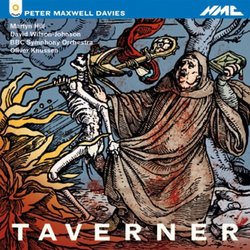| All Artists: Peter Maxwell Davies Title: Maxwell Davies: Taverner Members Wishing: 0 Total Copies: 0 Label: Indie Europe/Zoom Release Date: 12/8/2009 Album Type: Import Genre: Classical Style: Number of Discs: 2 SwapaCD Credits: 2 UPC: 5023363015721 |
Search - Peter Maxwell Davies :: Maxwell Davies: Taverner
 | Peter Maxwell Davies Maxwell Davies: Taverner Genre: Classical
|
Larger Image |
CD Details |
CD ReviewsA voice teacher and early music fan George Peabody | Planet Earth | 12/10/2009 (5 out of 5 stars) "NEW YORK TIMES (concerning this production): "REVEAL(S) THEATRICALLY AND (presents) A MUSICAL IDIOM THAT COMBINES MEDIEVAL MYSTICISM, MODERNIST VIGOUR AND HAPPY ACCESSIBILITY!"
I must agree with the 'Times' as to that comment, and further state that although this is not based on historical records John Taverner did exist and did have some minor difficulties with religion, but during that era, many others did too. Therefore, one has to agree that the stories about John Taverner's (1490-1545)abandonment of music, in favour of a career of hostility to English Catholicism, seem without foundation. He was employed as a musician and composer his entire life, mostly at Cardinal College (Christ Church) Oxford, and upon retiring, moved to Boston where he was held in high esteem. The popular, if mistaken, account of his life is the subject of this opera 'Taverner' by Peter Maxwell Davies (1934---) Davies is an English composer and conductor who has written a large number of compositions such as the highly emotional 'Eight songs for a Mad King'(1969), which is probably his best known work. His style ranges from early expressionistic to later more lyrical and reflective pieces. He wrote the music and the libretto for 'Tavener' which he based on letters and documents of the 16th century, and states clearly that this is a 'non-realization' of Taverner's life. But it makes a great opera, none the less. Radio 3 BBC ran it an entire week; not this recording, but a live performance from Glasgow, but I do think that this recording from 1996, is of a much better performance quality than the recent performance. I listened to all of it on the BBC and was fascinated by the story as it developed; highly dramatic; much instrumental and vocal variety. Davies worked on this from 1962 until 1968, and it was first performed at Covent Garden in 1972 with Edward Downes conducting. The opera is in two acts and set in the 16th century amidst the religious turmoil of the Reformation, but the composer's libretto also explores wider issues of creative truth and self-betrayal. Tavener is on trial before the White Abbot, accused of following the Lutheran Heresy, but he is saved by the Cardinal (Wolsey) before judgement can be given. Taverner debates for himself the religious meaning of his music, and begins to find wrong practises in the Catholic Church, and is moved to seize a sword against Catholic doctrine. In Act Two, a nightmare version of the first act, is another very accelerated and 'black' trial, in which the Judge and the White Abbot is accused, the crime this time being that of adhering to the old religion. There are many twists and turns in the plot, but none that one cannot follow. The Cast is truly outstanding: Martyn Hill as Taverner is magnificent, better than I have heard him, and David Wilson Johnson (baritone) as the Jester plays his role,and it's an interesting one, with fervor. There are many minor cast members of note such as Michael Chance as the Priest and God the Father, with some wild solo spots that demand great vocal technique as do many of the roles. The groups involved both instrumental and vocal are many and all excellent: London Voices, New London Children's Choir, BBC Symphony Orchestra, Fretwork, and his Majesty's Sagbutts and Cornetts. I am including a brief paragraph from 'The Guardian' commenting on this work: "No single work in Davie's now-volumnous output has greater significance in his composing career...Davies' vocal and orchestral forces are vast, and with its constant use of Taverner's own music as a thematic source, his score is an extraordinary labyrinth of transformation. But as Knussen(concuctor) and his superb cast, led by the tenor Martyn Hill as Tavener, himself, with David Wilson Jones as the Jester and Stephan Richardson as the King, constantly demonstrates, it is also wonderfully communicative, and the whole bundle of issues it confronts, religious and political and artistic, are as relevant today as in the 16th century or when Davies composed the work in the 1960's." " |

 Track Listings (9) - Disc #1
Track Listings (9) - Disc #1